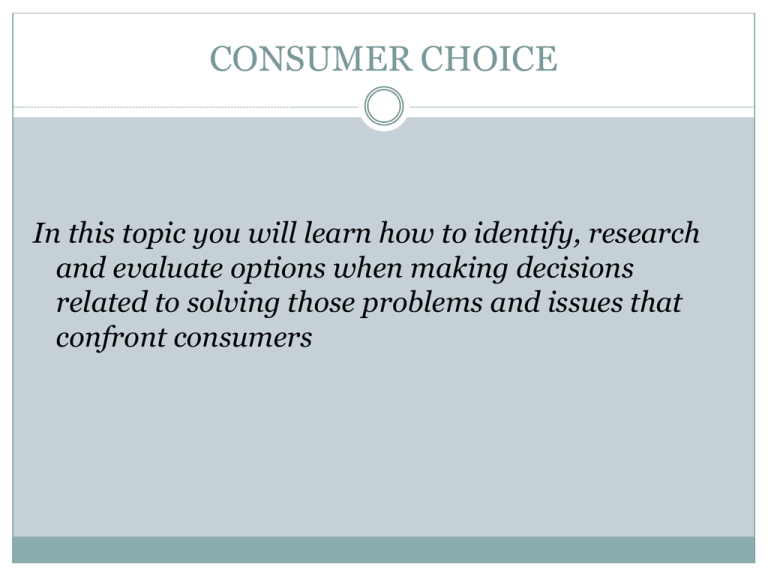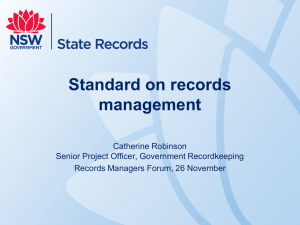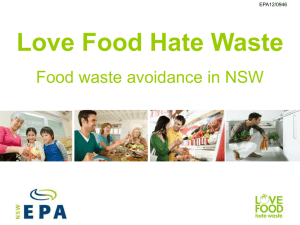consumer choice 9.5.11
advertisement

CONSUMER CHOICE In this topic you will learn how to identify, research and evaluate options when making decisions related to solving those problems and issues that confront consumers Life is full of choices Commerce and choice: CREATING POSTERS Decisions affecting the quality of your lives consumer financial business Employment Legal Environmental ON POSTERS: CREATE A MIND MAP OF THE DIFFERENT CONSUMER DECISIONS CONSUMER DECISION MINDMAP TO INCLUDE... CONSUMER DECISIONS: A consumer is someone who purchases goods and services to satisfy needs and wants..why has this process become increasingly more difficult in today’s world? CHOICE...!As more choice becomes available, it is increasingly difficult for consumers to make wise decisions 3 basic questions before deciding to buy something are: 1. Do I really want to buy this item? 2. Can I afford it? 3. Is there something better? Financial Decisions The most basic financial decision consumers need to make is how much of their income to save and how much to spend What is income? To gain the greatest possible satisfaction from their income, many people develop a financial plan..BUDGETS A budget assists you to make wise financial decisions because it controls your desire to buy on impulse Financial decision of payment: cash or credit FIDO: http://www.asic.gov.au/asic/pdflib.nsf/LookupByFileName/Budget_plannerv2.pdf/$file/Budget_planner-v2.pdf Budget Business decisions Have you ever babysat..? Then you have entered the world of business As a ‘business owner’ you must make a number of important decisions. How well you make these decisions largely determines the success of your business. The main business decisions include: To whom will I sell my good or service? How much will I charge? Where will I buy my supplies? How will I market my business? Sarah Glover: slide show HTTP://SARAHGLOVER.COM.AU/ Employment decisions What do you want to do after you leave school? Employment decisions What am I good at? What do I love? Choose a job you love, and you will never have to work a day in your life. ~ Confucius work “Work is the refuge of people who have nothing better to do” Oscar Wilde Every day I get up and look through the Forbes list of the richest people in America. If I'm not there, I go to work. ~Robert Orben The brain is a wonderful organ. It starts working the moment you get up in the morning, and does not stop until you get into the office. ~Robert Frost Employment Difficult to decide what you want to do when you leave school and the labour force is changing so rapidly The decision on which career path to take is one of the most important you will make. Therefore, you need to investigate the various options. When deciding on a career what should you consider? Employment decisions Things to consider: Your abilities, interests and personality The careers market – what is available now as well as future prospects How to become qualified and prepare yourself for a job What happens when you get the job Legal Decisions When you purchase something you make a number of legal decisions When you buy an item you assume that: 1- The goods will be of a merchantable quality: that is, of an acceptable quality in keeping with the price that you must pay for them 2- The sale involves a contract between two parties in which each party agrees to provide something of value for the other. Purchasing tomatoes>more significant purchasing decisions... Legal Decisions ...it may be difficult to determine on first inspection if a product is faulty, especially if it is well packaged. Consequently, laws have been developed to protect the consumer. If you buy a product and then find it is faulty, you need to be aware of your rights and responsibilities according to the law for consumer protection Can you think of an example? Environmental decisions Responsibility to protect the world’s environment for now and the future As a consumer you can decide to purchase products that are less harmful to the environment You can recycle Consumers are being encouraged to consider alternatives to the plastic shopping bag because it is not biodegradable Commerce and choice In pairs: identify and classify examples of different types of commercial and legal decisions that people make on a daily basis HINT: It may help you to think about each activity you do from the time you wake up until you go to sleep..on a weekend. Classification into the following categories 1. Consumer 2. Financial 3. Business 4. Employment 5. Legal 6. Environmental TASK Collect 3 examples of decisions made in your own life and write an explanation of the factors affecting your consumer decisions. E.g. Buying a dog, TV, laptop, bed etc Commerce and choice What is a good and what is a service? DEBATE “That plastic shopping bags should be banned as in South Australia” Commerce and choice What is comparison shopping and why do we do it? Who mostly comparison shops? Commerce and choice Most goods and services are available from more than one retailer. Often the same product costs different amounts at different stores. Shopping around to obtain the best deal is referred to as comparison shopping. Usually when making a MAJOR PURCHASE e.g.? Commerce and choice Comparison shopping: When making a major purchase, it is essential you compare the price, quality, availability and after-sales service. The more INFORMED you are about the items you intend to buy, the better shopper you will be...why? Consumer decisions COMPARISON SHOPPING - Types of goods and services Consumables, household goods, luxury items, repair services or information services - Different brands and products Well-known, highly reputable brands tend to be more expensive than those brands that are not well known. Is this due to quality? - Choosing what to buy Commerce and choice Did you know many Australian families spend up to 40% of their disposable income at the supermarket each week..! How do you decide where to buy different things? BRAINSTORM: How many different ways are there to buy? Consumer decisions CHOOSING WHERE TO BUY - Range of locations and sources - Types of retail outlets - Internet purchasing and mail order - Locally, interstate, globally - Ways of buying: Phone, internet, door to door, magazines, markets, outlets, itunes, petrol pay at the pump, sms, self service at coles etc, vending machines.. Consumer decisions Short essay: explain the factors influencing decisions to buy locally, regionally, interstate or globally, retail or wholesale or on the internet... What products would you buy where Soap: Pasta: Cheese: Dress: Handbag: Music, films, etc: Consumer decisions KEY FACTORS AFFECTING CONSUMER DECISIONS - finance, price, marketing, age, gender, convenience, service - Environmental considerations Consumer protection The need for consumer protection- scams and rip-offs SCAM WATCH: http://www.scamwatch.gov.au/content/index.phtml/itemId/693900 Shopping SHOULD be enjoyable, but can be frustrating and stressful if you are unaware of your RIGHTS as a consumer. unconscionable conduct by businesses? Advice to beat cheats and save money and time! TASK: Worksheet on scams and rip offs Consumer protection: scams and rip-offs Misleading advertising: bait and switch (low price/limited items) ‘Fake’ price reductions: E.g. ‘reduced to 29.95’ when original price was $30. Consumers have a right to know what original price was! Illegal for retailers to invent a higher figure Double taking: two or more prices on a product or service and customer charged the higher price. Illegal practice under the Trade Practices Act 1974 (Cwth) and consumers have the right to complain to consumer affairs department Overvalued and unsafe vehicles: 2nd hand motor vehicle industry has a poor reputation due to unlicensed motor dealers purchasing old, run-down cars add paint and pass them on for higher prices. Office of Fair Trading complaints. Unsolicited goods: sending people goods they didn’t ask for them demanding payment. Usually books, magazine etc in the hope that the potential customer will want to order more. NSW consumer protection law gives consumers 2 choices. Write to seller and they will return goods and if no collection in a month consumer can keep them at no charge. Sender does not have right to use legal action or debt collectors. Door-to-door sales: If dishonest or high-pressured techniques are used to force a sale. Make unrealistic claims. Key to success is to avoid being bullied and ask relevant questions. Who is the salesperson and to what company is the salesperson connected? What is the total price of the product? Physical force or harassment by a salesperson is illegal and you have the right to ask the salesperson to leave your property. SEE TXT Pg. 21 Pyramid schemes: NSW Fair Trading Act 1987 outlaws these. Promise of quick and easy money in return for a ‘joining fee’. Only people at the top benefit. Internet offers: ‘guaranteed income’ in return for an upfront membership fee. IF THEY SOUND TOO GOOD TO BE TRUE THEN THEY PROBABLY ARE! Consumer protection Features of a simple contract WHAT IS A CONTRACT? FEATURES OF A SIMPLE CONTRACT ANY agreement to buy or sell goods and services, whether it is written or spoken, is a form or contract. This means that both the buyer and seller have important rights and responsibilities that can be enforced by LAW Each person assured that the other individual or business involved in the contract will perform their part of the agreement. ARE ALL CONTRACTS MADE IN WRITING? CONTRACTS SOME types of sales contracts are required by LAW to be made in writing. For a contract to be legally enforceable it must have 6 ESSENTIAL FEATURES:see pg. 24 of txt. 1: LEGAL OBJECT 2:POSSIBLE TO PERFORM 3: CONSIDERATION 4: LEGAL RIGHT 5:INTENTION 6: OFFER AND ACCEPTANCE CONSUMER PROTECTION: KEY TERMS CONSUMER SOVEREIGNTY MERCHANTABLE QUALITY UNCONSCIONABLE CONDUCT CONSUMER PROTECTION: KEY TERMS CONSUMER SOVEREIGNTY: The POWER of consumers to decide which businesses and products survive in the marketplace. MERCHANTABLE QUALITY: Fit for the purpose for which a good is bought. (PRICE MATCHES QUALITY) UNCONSCIONABLE CONDUCT: Dishonest and unfair conduct by individuals or businesses providing goods and services to consumers Documentary: Consuming kids Consuming Kids throws desperately needed light on the practices of a relentless multi-billion dollar marketing machine that now sells kids and their parents everything from junk food and violent video games to bogus educational products and the family car. Drawing on the insights of health care professionals, children’s advocates, and industry insiders, the film focuses on the explosive growth of child marketing in the wake of deregulation, showing how youth marketers have used the latest advances in psychology, anthropology, and neuroscience to transform American children into one of the most powerful and profitable consumer demographics in the world. Consuming Kids pushes back against the wholesale commercialization of childhood, raising urgent questions about the ethics of children’s marketing and its impact on the health and well-being of kids. Consumer protection Legal rights and protective legislation for consumers Australia’s consumer protection laws provide consumers with important rights. The NSW Office of Fair Trading outlines four important consumer rights: 1. Goods and services should be safe and of merchantable quality. A consumer has the right to purchase goods that are of reasonable quality and fit for the purpose for which they were bought. E.g 2. Right to be protected from misleading and deceiving practices. 3. Information provided with goods and services should be accurate and, by law, is required to give details such as the price, and the content and weight of the package. Care instructions must be labelled on garments and textiles 4. Safety instructions should appear on dangerous products. Consumers should be informed of the correct way of using a product and any potential dangers the product may present Steps in resolving a consumer complaint Draw this up and use an image to represent each step. On page 22. STEP 1: Identify the problem –gather relevant documents, including receipt and warranty STEP 2: Contact the business without delay – write to or phone the person you had a problem with or the manager to seek a remedy STEP 3: Contact the relevant industry association or ombudsman – NSW Office of fair trading/Cth ombudsman STEP 4: Contact the state government's consumer affairs department – can inform you or your rights STEP 5: Contact a mediation/conflict resolution service STEP 6: Contact a court or tribunal - courts and tribunals can make a decision that is legally binding. However, this can be a very costly way to resolve a dispute Write a letter Have you ever been with your parents when you got a parking fine? Have you ever got the wrong product or faulty product and written a letter about it? See page 1.3c TAKE ACTION: new law, new road etc you are unhappy with, do something about it. LEGAL RIGHTS AND PROTECTIVE LEGISLATION FOR CONSUMERS See pg. 25 of text Trade Practices Act 1974 (Cwth) Prices Surveillance Act 1974 (Cwth) The above laws administered by the... Australian Competition and Consumer Comission (ACCC) LEGAL RIGHTS AND PROTECTIVE LEGISLATION FOR CONSUMERS Trade Practices Act 1974 (Cwth) Aim of this act is to improve the wellbeing of Australians by promoting competition, fair trade and consumer protection. This law deals with issues such as anticompetitive and unfair practices, product safety, conditions and warranties, and actions against manufacturers and importers. Prices Surveillance Act 1974 (Cwth) Designed to protects consumers against unfair price increases. The Act gives the ACCC the power to monitor and report on the prices, costs and profits of companies and government authorities. The above laws administered by the... Australian Competition and Consumer Commission (ACCC) Can launch a public inquiry into the price of particular goods and services and force businesses to notify the ACC of any intention to raise their prices. The ACCC has recently investigated trends in petrol prices, airport and postal services to determine whether they are in breach of the act. POSTERS ON COMPUTERS: INFORMING CONSUMERS OF THEIR RIGHTS AND FEATURES OF A CONSUMER CONTRACT YOUR RIGHTS/RESPONSIBILITIES AS A CONSUMER – see pg. 25 POSTER FOR NEW AUSTRALIAN CITIZENS/EXCHANGE STUDENTS http://www.moneystuff.net.au/Default.aspx?alias=ww w.moneystuff.net.au/nsw Honey, who shrank the groceries? http://www.smh.com.au/business/honey-who- shrank-the-groceries-20110329-1cen2.html Michaela visit GLOBILISATION DEBATE “It does not matter how far apart we might all be geographically, economically or culturally, globalisation unites us all.” Each student should come up with 3 written points for or against this statement. Commercial vs ethical chocolate...the test Conduct a taste test of commercial chocolate as opposed to ethical chocolate. Visit www.worldvision.com.au and obtain a list of brands from the Good Chocolate Guide to Australia. Create a table and compare packaging, price, taste, quality and availability. Organisations that provide assistance for consumers In Australia, legal assistance for consumers can be obtained from government authorities at the national and state levels as well as from independent associations around the country. Which organisations provide assistance for consumers? - Government departments and organisations – state and federal - Independent organisations Organisations that provide assistance for consumers STATE GOVERNMENT AUTHORITIES: Office of Fair Trading NSW: http://www.fairtrading.nsw.gov.au/default.html The Consumer, Trader and Tenancy Tribunal (CTTT) http://www.cttt.nsw.gov.au/default.html Research: what are their roles? Office of Fair Trading NSW: http://www.fairtrading.nsw.gov.au/default.html Aims to protect consumer rights in NSW Provide advice for businesses about fair and ethical retail practices To administer the rules that ensure transactions between consumers and traders (businesses) are fair Investigates unfair business practices and operates a licensing system to ensure that employees in a range of NSW Industries are appropriately qualified Administers more that 80 state laws that protect consumer rights in NSW The Consumer, Trader and Tenancy Tribunal (CTTT) http://www.cttt.nsw.gov.au/default.html Is a NSW court that aims to resolve consumer-related 1. 2. 3. 4. 5. 6. 7. 8. disputes as well as trader and tenancy-based matters (those involving rental property and housing) There is a small fee to lodge an application, discount for pensioners 140 venues in NSW for hearings The NSW Office of Fair Trading can refer consumers to the tribunal Deals with matters under 8 main categories: Home building Residential parks Motor vehicles Retirement villages Tenancy (housing) issues Commercial matters General consumer issues Strata and community schemes Federal Government departments The Australian Competition and Consumer Policy Division within the Department of Treasury aims to protect and promote the power of consumers = consumer sovereignty The Australian Competition and Consumer Commission: ACCC also deals with consumer concerns ACCC handles issues sch as anticompetitive and unfair market practices, mergers or takeovers of companies and product safety/liability ACCC only national agency dealing generally with competition matters in Australia: http://www.accc.gov.au/content/index.phtml/itemId/142 Ombudsmen If you experience problems in your dealings with a government department you will need to contact the ombudsman Ombudsman is an independent official who has been appointed to deal with complaints against either government departments or private businesses. In Australia we have a Commonwealth Ombudsman as well as state and territory ombudsmen Industry ombudsmen http://www.ombudsman.gov.au/ http://www.ombo.nsw.gov.au/ Independent organisations Australia Consumer’s Association (ACA) What are the other organisations: Kidsafe, community organisations Payment choices What different ways can we pay for things? Payment choices: methods of payment CASH DIRECT DEBITS CHEQUES CREDIT CARDS BOOKING IT UP LAY-BY ELECTRONIC FUNDS TRANSFER Bpay EFTPOS Payment Set up tables to determine the most appropriate methods of payment in a range of contexts Method of Payment Definition Advantage Disadvantage An example of when and who may use this method Cash Direct Debits Cheques Credit Cards Booking it up Lay-by Electronic funds transfer Bpay Eftpos Cash Def: The most liquid asset! Many consumers still prefer cash Advantage is it is immediate All shops accept cash and often things can only be purchased using cash e.g.? Easy to monitor how much cash you have Limit dealings with bank No interest Can potentially negotiate lower prices when pay for items with cash HOWEVER: Bulky, not secure...any others? Direct Debit Avoid inconvenience of paying bills by mail or at the bank by setting up a direct debit from regular savings or cheque account Popular for household services (utilities, gas, phone electricity) Gym Health insurance Rent However..what can go wrong? Cheques Written instruction asking for funds to be transferred from young bank account into someone else’s Convenient when paying for expensive items HOWEVER Checks may bounce Time it takes for funds to ‘clear’ See example of cheque on page 30. Credit Card/s Enable customers to purchase goods and services with money lent to them by a bank, other financial institution or retailer Usually have an interest-free period within which consumers can accumulate debt at NO CHARGE After this date INTERST is charged on the daily outstanding balance Useful when used effectively What types of credit cards are there? When are credit cards really useful? Phone, internet, can build positive credit for future loans with good track record...music concerts.. PIN VS SIGNATURE ... Booking it up Used in rural communities and remote parts of the country Has any one had experience with this? Retailers offer small amounts of short-term credit to customers so that they can make purchases at their store. In return, customers need to provide some form of security such as a debit card and pin number HOWEVER what are some of the problems? Lay-by Provided by a limited number of retail stores Allows us to purchase goods when we don’t have the money to buy them up front Retailer will hold the goods at the store for a specified period of time until you have paid for them No interest is charged with lay –by Also protects you from potential price increases in the product Seller will hold goods at original price unless you fail to make the payments as agreed Electronic funds transfer The term EFT =electronic funds transfer Refers to all types of financial transactions that are carried out electronically EFTPOS, Bpay, Internet banking and using and ATM WESTPAC YESTERDAY? Question to think about and answer after listening to clip.. Do you think that Westpac should have to compensate people for this technical glitch? Explain why or why not. Bpay Method of making electronic payments Enables you to pay your bills over the phone or using the Internet Reduces the time and cost associated with traditional bill payment and is available 24 hours a day, 7 days a week! Funds used for Bpay come from where? An example! EFTPOS ELECTRONIC FUNDS TRANSFER AT POINT OF SALE! = EFTPOS , has become a popular method of paying for goods and services Allows you to pay for items directly from your bank account using a plastic debit card and a PIN = Personal identification number Disadvantages...? Class discussion Discuss the need for banks to provide banking facilities in remote areas? ATM’s in pubs/pokies debate? Keeping records Wise consumers keep records of their income and expenditure over time Storing important documents such as: Records of purchases (cash and EFT receipts) Bank statements Pay slips Product instructions and warranties Banks send you a monthly/quarterly statement and you should check these statements against your records why? Also important for the ATO= Australian Taxation Office- they may ask for receipts to justify claims on your annual tax return Importance of Budgeting E.g. Why and how has this changed? Changes over time and the impact of technology Online and internet shopping EFTPOS SELF- CHECKOUT SMART CARDS.... TASK: a) YOU ARE TO FIND A NEWS ARTICLE ON A NEW PAYMENT TECHNOLOGY THAT WILL TRANSFORM THE WAY WE SHOP (e.g.) (it could be one of the above or something different) b) SUMMARISE THE ARTICLE c) LIST ARGUMENTS FOR AND AGAINST THIS NEW TECHNOLOGY AND CONCLUDE BY INCLUDING YOUR OWN OPINION ** Please note your article can be a radio story but ensure you don’t use articles/stories from poor sources, what is a good source? The SMH online, ABC ratio national online, The Australian Newspaper online, The New York Times, The Economist, BRW, Time Magazine etc Financial literacy! Define Financial literacy and examine how it assists a consumer – thus need for equity with indigenous people FEDERAL BUDGET Budget vs budget! Explain the type of person that would benefit most from the federal budget BUDGET: BUDGETING Construct a budget using Monday Smart or FIDO website: http://www.moneysmart.gov.au/tools-andresources/calculators-and-tools/budget-planner Title: My personal budget (remember Budget vs budget!?!) Methods of keeping records Develop and use spreadsheets and databases to maintain effective record and monitor monthly transactions including running totals of cash, direct debit and credit purchases Changes over time and the impact of technology Identify how technology has impacted on payment processes of businesses and consumers






